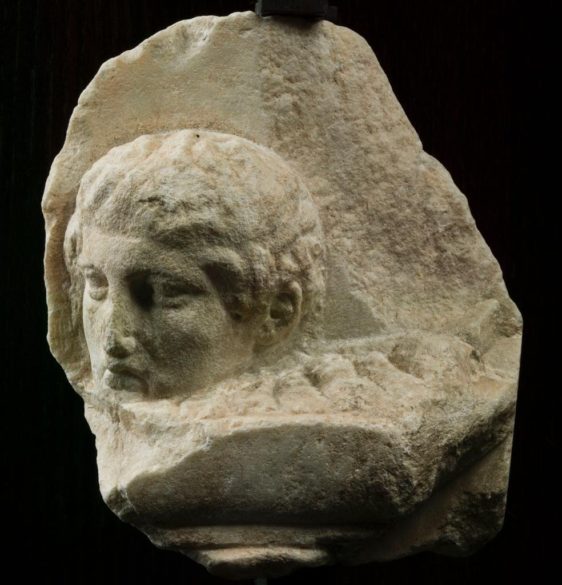
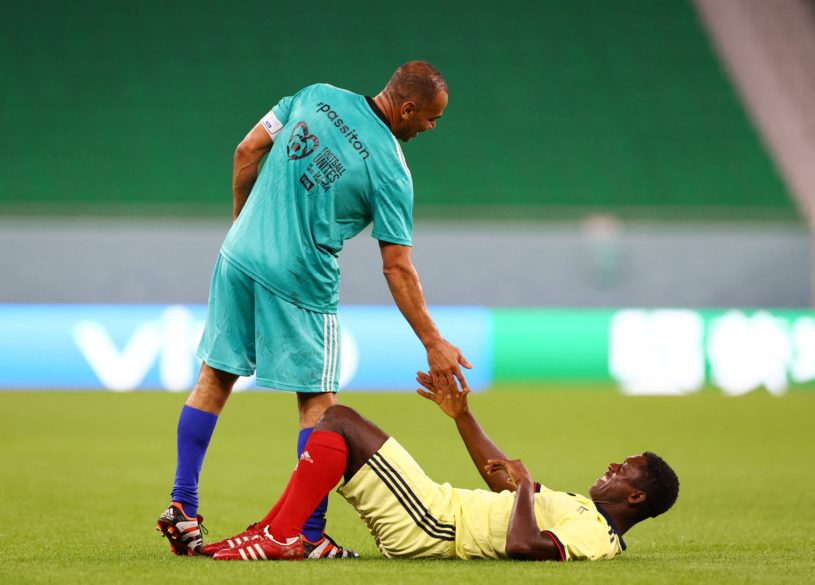
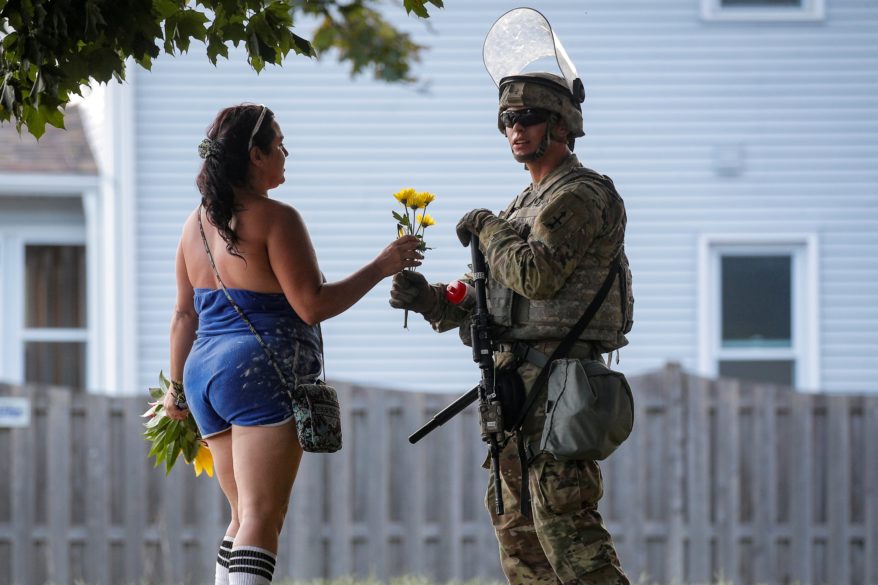
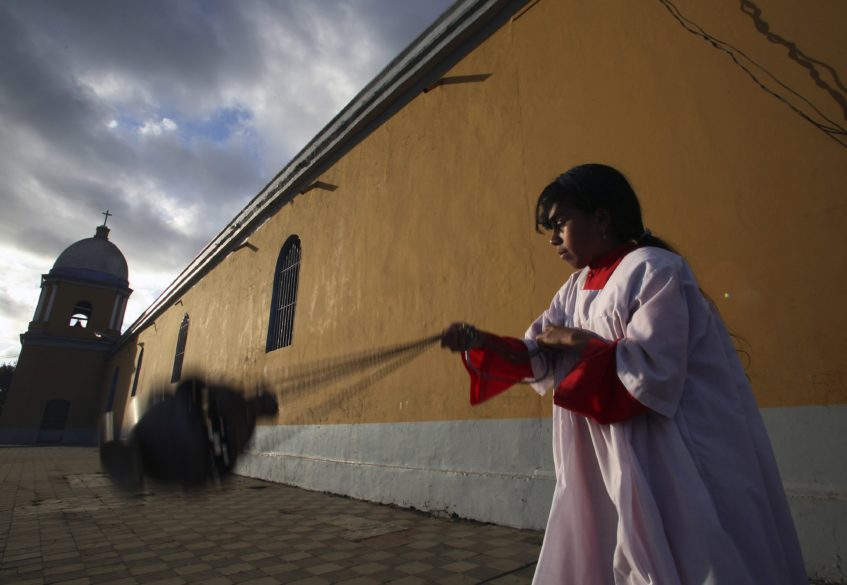
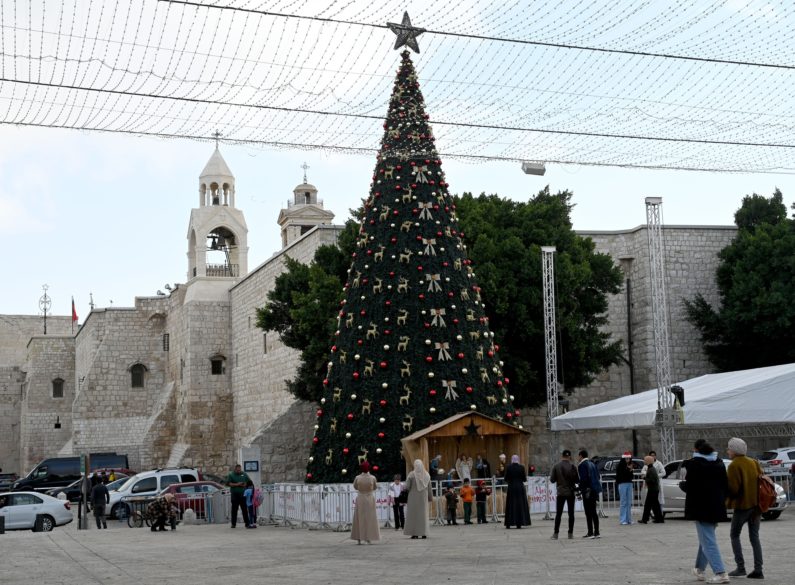





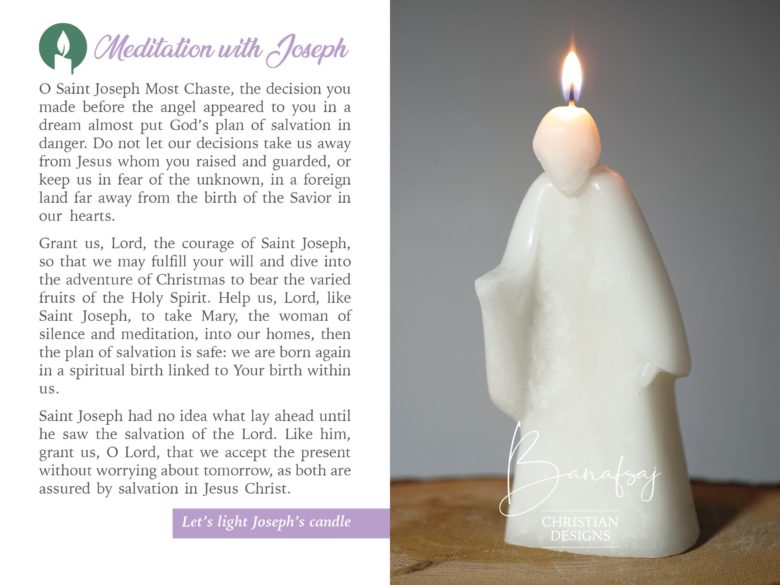
NATION
PROVIDENCE, R.I. (CNS) – In the past several years, an increasing number of Providence College graduates have pursued a vocation with the Dominican order that runs the Rhode Island university. “During the five years I was in Providence, we had at least one student enter the novitiate at the end of each year,” said Dominican Father Michael Weibley, whose first assignment after ordination was as a chaplain and professor at Providence College. “An average of a novice a year like that is a tremendous blessing for the order,” said the priest, who this year was named pastor of SS. Phillip and James Parish in Baltimore. The increased number of vocations coming from the college emerges in a climate of declining rates of new vocations, particularly for religious orders: In the past 60 years, the total number of active religious priests in the United States has been reduced by more than half. In the past 20 years, the Dominican Province of St. Joseph, which comprises the Northeastern corner of the United States, has been reporting steadily increasing vocations, with many of the new recruits being drawn directly from Providence College. For the novices currently emerging from Providence College, the call to preaching seems to be coming at a much younger age. Seeing “younger and younger friars on campus or students your own age going directly into the novitiate after graduating” makes it “easier to envision yourself actually pursuing that lifestyle,” said Dominican Brother Nicodemus Thomas, a 2018 graduate.
VATICAN
VATICAN CITY (CNS) – Pope Francis told Italian students to “dream big” like St. John XXIII and the Rev. Martin Luther King Jr. about the world of peace and justice they would like to see. And at the same time, he wished them a good Advent journey “made up of many small gestures of peace each day: gestures of acceptance, encounter, understanding, closeness, forgiveness and service. Gestures that come from the heart and are steps toward Bethlehem, toward Jesus, who is the prince of peace.” Pope Francis met Nov. 28 with some 6,000 Italian schoolchildren, teens and their teachers, who have been participating in the program of the National Network of Schools for Peace. The program is focusing on the theme, “For Peace. With Care,” and Pope Francis told them that the second part is essential. “Usually, we talk about peace when we feel directly threatened, as in the case of a possible nuclear attack or a war being fought on our doorstep,” the pope said. And “we care about the rights of migrants when we have some relative or friend who has migrated.” But even when war is not near or threatening someone known, “peace is always, always about us! Just as it always concerns another, our brother or sister, and he or she must be taken care of,” the pope told the students.
WORLD
BEIRUT (CNS) – Violette Yammine aims to illuminate Advent and Christmas hope for Lebanese facing tough times. The graphic designer has launched an “Advent Box” that includes a “Meditations for Advent with the Holy Family” booklet, with an accompanying set of Holy Family figurine candles. Separately, there is also a children’s Christmas story. The two Christmas season family participation projects are the first offerings of Yammine’s Catholic design firm “Banafsaj,” which is how Violette is pronounced in Arabic. Yammine, a Maronite Catholic, considers her enterprise – Banafsaj Christian Designs – a way “to offer beautiful violets, and scents, to the Lord.” In Lebanon, she noticed, most Christian family-oriented publications are produced by evangelical churches. So, she decided “to put all my talent in the service of Christ.” The Advent booklet and accompanying Holy Family candles are intended for the three Sundays preceding Christmas. Yammine said she hopes it will spark “an Advent well spent in prayer.” The first Sunday reading concerns the Annunciation, intended for the Mary candle. The second Sunday reading is the revelation to Joseph, and thus the Joseph candle. The birth of Jesus is the third and final Sunday reading, with the candle of baby Jesus in the manger.
ACCRA, Ghana (CNS) – As Ghana’s national soccer team, the Black Stars, joins other national teams for the 2022 FIFA World Cup in Qatar, some Ghanaian citizens have been talking about Iñaki Williams, who was named after a Catholic priest. His parents, Ghanaians Felix Williams and Maria (Mary) Arthuer, crossed the Sahara and, when they got to Morocco, jumped the border fence to Melilla, one of two Spanish cities in North Africa. The Guardian reported that, on the advice of a lawyer, they said they were from Liberia to apply for political asylum. They ended up in Bilbao, Spain. A Caritas volunteer, then-Deacon Iñaki Mardones, was instrumental in helping them when they arrived in Bilbao. “I went to pick them up at Abando (railway) station,” Father Mardones told La Provincia, a Spanish magazine. At the time, Maria was seven months pregnant. “I remember them with the suitcase and the uncertainty on their faces,” Father Mardones told La Provincia. The report on them said they understood Spanish, “but when I started to speak they looked at me without understanding anything. When I switched to English they sighed in relief.” He helped them to an apartment used by Caritas, and even helped them get to the hospital for their child’s birth.
By Cindy Wooden
VATICAN CITY (CNS) – While some people want to “reform” the Catholic Church and others want “to put the brakes on the synod process,” those involved in preparing the continental phase of the synod process want “to mend” the church under the guidance of the Holy Spirit and the pope, said Cardinal Jean-Claude Hollerich of Luxembourg, relator general of the synod.
As final plans are made for the continental phase leading to the Synod of Bishops 2023-24, the bishops and coordinators responsible for the regional meetings met at the Vatican Nov. 28-29.
The participants included Archbishop Timothy P. Broglio of the U.S. Archdiocese for the Military Services, president of the U.S. Conference of Catholic Bishops, and Bishop Raymond Poisson of Saint-Jérôme and Mont-Laurier, Quebec, president of the Canadian Conference of Catholic Bishops.
Archbishop Broglio told Catholic News Service Nov. 30 that the meeting was “well-planned” and “quite universal,” while also making it clear how the “continental phase” was being organized differently in each part of the world.
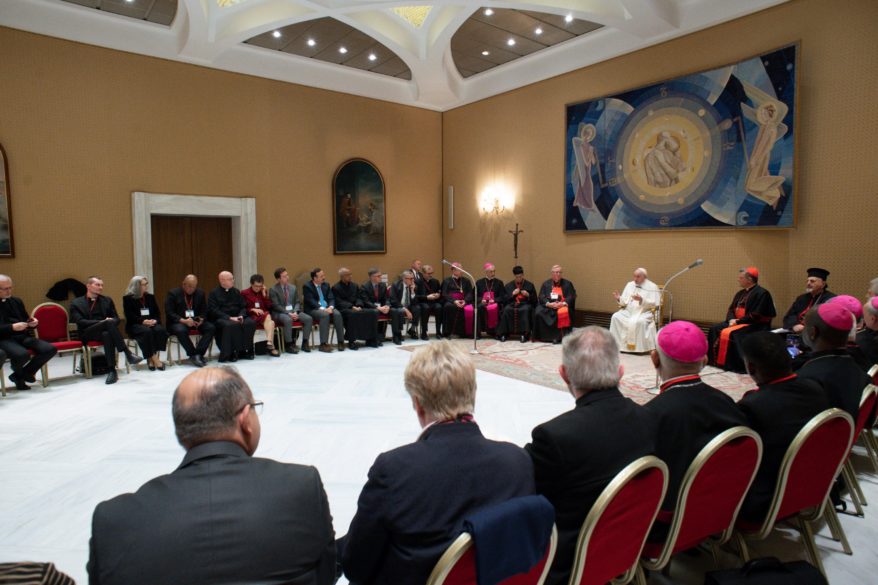
Meeting Pope Francis late Nov. 28, Cardinal Hollerich said the synod process has faced “temptations” along the way.
Particularly in the media, he said, there is a temptation to politicize the church, looking at it “with the logic of politics.”
But, he said, the 30 participants from around the world who met at the Vatican in late November “want to be able to enter into a true discernment, an apostolic, missionary discernment, so that the synodal church can carry out its mission in the world. We want to walk together with you and, above all, with the Holy Spirit and with Jesus, in order to mend our church.”
The meeting at the Vatican was meant to help finalize plans for the regional gatherings called to reflect on the “Document for the Continental Phase,” a document released in late October and echoing the themes that emerged from all the national syntheses of synod listening sessions and the contributions of religious orders, Catholic movements, Vatican dicasteries and nuncios from around the world.
Participants in the continental phase will be asked to discuss what in the document “resonates” with them or what they believe is missing, said Xavière Missionary Sister Nathalie Becquart, one of the synod undersecretaries.
Vatican News, reporting on the meeting Nov. 28, said representatives discussed some of the challenges the process already has raised, including “the small minority of people who have participated so far; the challenge facing the church regarding how she carries out her mission; the prevalence of personal piety rather than community-building practices and ritual; (and) the vast amount of information, proposals and suggestions that makes synthesizing or coming to conclusions difficult.”
In addition, Vatican News said, some participants saw “the need for a definition of ‘inclusive’ regarding how the voices and views of non-Catholics or former Catholics is envisioned; misunderstanding that the consultation process is meant to grant all of the requests people are raising; bringing out the voices of women is a challenge particularly in those places where societies are still patriarchal; (and) media interpretation of the synod from a sociological rather than ecclesiastical slant.”
The bishops of the United States and Canada have decided to hold 10 online sessions for their continental phase; the meetings, scheduled for 90 minutes, will take place from Dec. 14 to Jan. 21 with five sessions in English, three in Spanish and two in French.
Archbishop Broglio said the bishops chose the format to increase the number of people able to participate.
“I hope there will be an opportunity to listen to the concerns of different people,” he said. “If you do not listen, you do not know where people are,” which is essential for helping them come to a deeper relationship with Jesus.
Speaking to Vatican News, the archbishop said he hoped that listening and sharing would “help heal, at least as far as the church is concerned, some of the polarization” evident in U.S. society.
“I think the emphasis that’s been placed on listening will be a great help if people enter into these moments of conversation and dialogue and discernment with a spirit of listening to the other,” he told Vatican News.
The bishops of Latin America and the Caribbean also will hold multiple meetings, although all four will be in-person gatherings. The meetings are scheduled for El Salvador, the Dominican Republic, Ecuador and Brazil between Feb. 13 and March 10. The bishops also have decided that 55% of the participants will be laypeople while 45% will be bishops, priests, deacons and religious.
The European gathering is scheduled for Feb. 5-12 in Prague with 200 people attending in person and up to 10 more delegates from each country following online. Catholics from Australia, New Zealand and other parts of Oceania will meet Feb. 5-9 in Suva, Fiji.
The Middle East meeting will be held Feb. 12-18 in Beirut, Lebanon, while the Asian meeting will be held Feb. 23-27 in Bangkok, Thailand. The bishops of Africa and Madagascar will sponsor a gathering in Addis Ababa, Ethiopia, March 1-6.
NATION
BALTIMORE (CNS) – The U.S bishops were encouraged to send participants to the African National Eucharistic Congress, slated for July 21-23 in Washington, and to come themselves. Auxiliary Bishop Eusebio L. Elizondo of Seattle, in a Nov. 16 address to the bishops, told them the congress, known as ANEC, would be “more engaging” beyond the workshops that are part and parcel of the multiday gathering. He said there would be Masses, a eucharistic procession, a rosary procession and cultural celebrations on the congress schedule. “The ANEC is the right ground for the new evangelization, an opportunity for all of us to engage – dioceses, parishes, religious congregations, associations and others – to address the pastoral needs of African Catholics in the United States,” he said. “Your presence will be a tremendous inspiration for those who will attend, and make the ANEC a success.” Next year’s African National Eucharistic Congress will be the fourth such gathering. It will be held on the grounds of The Catholic University of America in Washington. The congress is held every five years.
WASHINGTON (CNS) – Latinos may be changing American politics more than politics is changing Latinos. To hear speakers at a Nov. 16 Georgetown online forum, politics is trying harder to bring Latinos into the fold. Jens Manuel Krogstad of the Pew Research Center, in his work studying Latino demographics and politics, noted that Latinos do not identify as strongly with either the Democratic or Republican parties as do other Americans. “Latinos support for the two parties has ebbed and flowed over the decades,” Krogstad said during a forum sponsored by Georgetown University’s Initiative on Catholic Social Thought and Public Life on: “How Are Latinos Changing Politics and How Are Politics Changing Latinos?”
Democratic support peaked at 70% during the presidencies of Bill Clinton and Barack Obama, while GOP support got as high as 40% for George W. Bush and 38% for Donald Trump. “Latinos are not a monolith,” declared Olivia Perez-Cubas of the Winning for Women Action Fund, which recruits and gives financial backing to Republican women candidates. “The GOP depends on its ability to build a tent to diversify the party – which we’re not very good at but I think we’re working on – to speak to a diverse group of voters, and Latinos are very much a big part of that equation.” The upshot of the Nov. 8 midterm elections for Latinos is that “ the community is consequential – it is very consequential – in which party will control Congress, in which party will prevail in presidential elections,” said Julián Castro, a former U.S. secretary of housing and urban development.
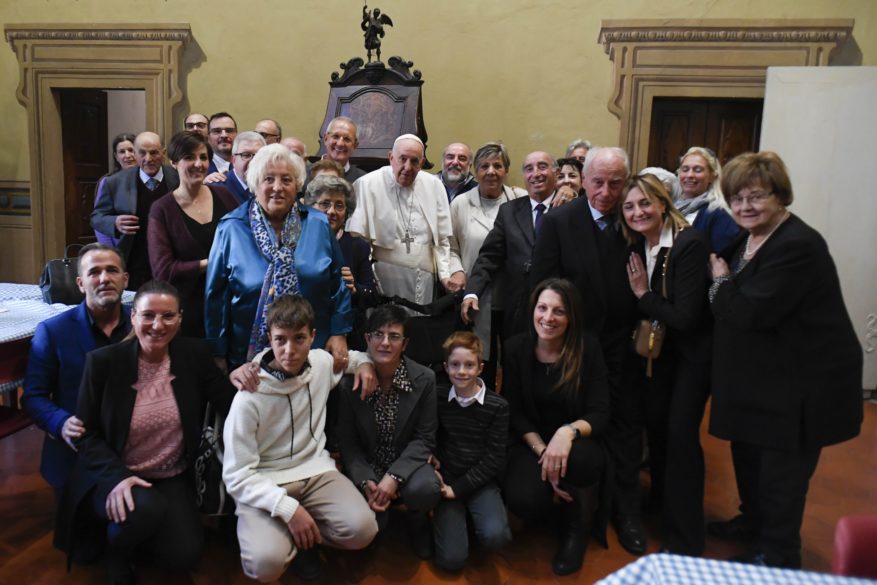
VATICAN
ASTI, Italy (CNS) – With several of his cousins and their children and grandchildren present, Pope Francis celebrated Mass in the Asti cathedral, giving a nod to his family roots and drawing people’s attention to the root of Christian faith: the cross of Jesus. The Mass Nov. 20, the feast of Christ the King and World Youth Day, was the only public event during the pope’s weekend visit to the region from which his grandparents, Giovanni Angelo Bergoglio and Rosa Vassallo, and his father Mario immigrated to Argentina in 1929. The visit was timed to coincide with the 90th birthday of Carla Rabezzana, the pope’s second cousin. And, after landing in Portacomaro near Asti Nov. 19 and stopping for a prayer in a village church, Pope Francis headed straight to Rabezzana’s house for lunch. After lunch, the pope visited a nearby home for the aged and then headed to the little village of Tigliole to visit another second cousin, Delia Gai. The cousins and their families joined an estimated 4,000 people for Mass with the pope the next day in the Asti cathedral. In his homily, sprinkled with words in the Piedmont dialect his grandmother taught him, Pope Francis focused on how the kingship of Christ is different from any idea people usually have of a king. “He is not comfortably enthroned but hanging on a gibbet,” the pope said. “The God who ‘casts down the mighty from their thrones’ appears as a slave executed by those in power.”
VATICAN CITY (CNS) – The Vatican is willing to do whatever it takes to broker a cease-fire and bring an end to the war on Ukraine, Pope Francis said. “We are continually watching as the situation evolves” concerning ways the Vatican’s diplomatic efforts could help, he said in an interview with the Italian newspaper La Stampa. Vatican News published the interview Nov. 18. The Vatican Secretariat of State is working diligently every day, looking at every possibility and “giving weight to every opening that could lead to a real cease-fire and real negotiations,” he said. “The Holy See is willing to do everything possible to mediate and end the conflict in Ukraine. We are trying to develop a network of relationships that will foster a rapprochement between the parties, to find solutions. Also, the Holy See does what it must to help the prisoners,” he said, as well as provide humanitarian support “for the people of tormented Ukraine, whom I carry in my heart along with their suffering.” Asked about the prospects for reconciliation between Russia and Ukraine, the pope said, “I have hope. Let’s not resign ourselves, peace is possible. But we must all strive to demilitarize hearts, starting with our own, and then defuse, disarm violence. We must all be pacifists,” he said.
VATICAN CITY (CNS) – The centuries’ old silver fir tree that had been destined to become the centerpiece Christmas decoration in St. Peter’s Square will now live, perhaps to see another century. Forest service rangers arrived at the scene – a mountain grove in central Italy’s Monte Castel Barone – Nov. 14 to alert workers to halt preparations for felling the tree. When it emerged back in 2019 that the small village of Rosello in Italy’s central Abruzzo region was donating the tree to the Vatican for 2022, local activists started flagging problems, such as the lack of transparency concerning the donation and the failure to carry out an environmental impact study. Dario Rapino, a lawyer and nature photographer, even wrote to Pope Francis in 2020, pointing to his encyclical “Laudato Si’ on Care for Our Common Home” and the importance of avoiding any unnecessary human impact on the environment, according to local media reports. Even the World Wildlife Fund had put out a statement Nov. 7 saying, “cutting a tree of this size in the midst of a climate crisis is a debatable decision,” which required “greater transparency.” However, it wasn’t until Rapino recently tracked down the 98-foot-tree, that he discovered it was not located in Rosello, much less in the region of Abruzzo, but was, in fact, in a protected area in the nearby region of Molise in the township of Agnone, according to a report Nov. 12 by ChietiToday. The tree’s size, he said, also put it at around 200 years old.
WORLD
SÃO PAULO (CNS) – The Vatican has advanced the sainthood cause of the late Archbishop Hélder Câmara of Olinda and Recife, who may soon be called “venerable.” Archbishop Fernando Saburido of Olinda and Recife made the announcement during the closing ceremony of the 18th National Eucharistic Congress. Archbishop Camara, one of the founders of the Brazilian bishops’ conference, was named to Olinda and Recife in 1964, three weeks before the beginning of the military coup that started the 20-year dictatorship in Brazil. Days after the coup, the archbishop released a manifesto supporting the Catholic workers’ action in Recife. The new military government accused him of being a demagogue and a communist, and he was forbidden to speak publicly. “If I give bread to the poor, everyone calls me a saint. If I show why the poor have no bread, they call me a communist and a subversive,” the archbishop is said to have said during that time. Dom Hélder, as he was known, remained a strong critic of the regime, denouncing human rights violations committed by police authorities.
OXFORD, England (CNS) – European church leaders have urged awareness of human rights issues during the FIFA World Cup in Qatar, amid continued criticism that the Gulf state was allowed to host the tournament. “Women continue to be held back in Qatar, while non-Islamic religions, including Christianity, are only granted limited freedom, and sexual minorities subjected to criminal prosecution. All of this expresses, not just from a Western viewpoint, a repressive state and social order,” said Bishop Stefan Oster of Passau, who heads Germany’s Catholic DJK Sportjugend sports association. He said questions were still asked about the 2010 decision by FIFA, the international soccer governing body, to award the tournament to Qatar, which has no soccer tradition. The bishop issued the statement Nov. 17 as final preparations were made for the 2022 World Cup, Nov. 20-Dec. 18. “Like other states on the Arabian peninsula, the Emirate of Qatar has been catapulted into a new era thanks to oil and gas wealth – today, a conservative-traditional Islamic society and economic hypermodern society coexist with each other,” Bishop Oster said. “Although it would be unfair to ignore this special situation when criticizing questionable conditions, it would also be inappropriate to keep silent about human rights restrictions.” The bishop said Qatar’s mostly foreign population was subject to “strict regulations,” while female domestic workers were often isolated and had trouble “upholding their rights against employers.” The situation had worsened, Bishop Oster said, during construction of stadiums and other sites for the World Cup. He said health and safety standards had been “catastrophic,” with “countless accidents and far too many deaths” among low-wage laborers.
NATION
INDIANAPOLIS (CNS) – It was a time of Scripture, prayer, music and fellowship. It also was a night to honor the late co-founder of the National Black Catholic Men’s Conference. But for those teenagers and adults from across the United States in attendance, Franciscan Father Agustino Torres’ message Oct. 13 was simple, yet powerful: “The Lord has sent me to bless you.” Father Agustino, who ministers for his order in the New York borough of the Bronx and is founder of the Hispanic youth ministry Corazon Puro, was the keynote speaker on the first night of the four-day conference at St. Rita Church in Indianapolis. The gathering drew about 300 people. It was the first in-person gathering since 2019 because of the COVID-19 pandemic. The priest said he ministers to people in the inner city, and the heart of his mission is trying to bring them hope. With that hope he also delivers his blessing, much like the blessing he offered to the attendees. “This blessing is meant to be shared, this blessing is meant to be given, this blessing brings joy,” he said. “This blessing brings life, this blessing heals. … And I love sharing the blessing because someone has shared the blessing with me.”
WASHINGTON (CNS) – For the world-renowned emblems of the Catholic faith, such as St. Teresa of Kolkata, elevation to sainthood comes fairly quickly following their deaths. For many others, the sainthood cause is a slow process that sometimes lurches to a stop. One example is Venerable Nelson Baker, the Buffalo, New York, priest who died in 1936 and is the only Civil War veteran with a sainthood cause. Father Baker, who served at St. Joseph’s Cathedral in Buffalo after his ordination in 1876, was beloved in his lifetime for his charitable efforts for the poor, including serving thousands of meals during the depths of the Great Depression. Dubbed by local newspapers as “the padre of the poor,” he built the Basilica of Our Lady of Victory in Lackawanna, New York, an orphanage, a maternity hospital, a trade school and a home for infant care. The charitable work he began exists today as OLV Charities. Our Lady of Victory institutions include Homes of Charity, Baker Victory Services and Our Lady of Victory Elementary School. Born in 1842, Father Baker entered the priesthood after operating a successful feed and grain business with a partner. Before that, he served in the 74th Infantry of the New York State Militia, a unit that organized in the summer of 1863 and was stationed in Central Pennsylvania, although it didn’t see combat.
VATICAN
VATICAN CITY (CNS) – During the month of November, Pope Francis is asking people to pray for children who are suffering because of poverty, war and exploitation. “Let us pray for children who are suffering, especially for those who are homeless, orphans and victims of war. May they be guaranteed access to education, and may they have the opportunity to experience family affection,” the pope said in a video released Oct. 31. In the video message released by the Pope’s Worldwide Prayer Network, the pope explained his November prayer intention: “For children who suffer.” “An abandoned child is our fault,” the pope said in the message. “Each marginalized child, abandoned by his or her family, without schooling, without health care, is a cry! A cry that rises up to God and shames the system that we adults have built,” he insisted. Pope Francis noted that there are millions of boys and girls around the world living “in conditions very similar to slavery.”
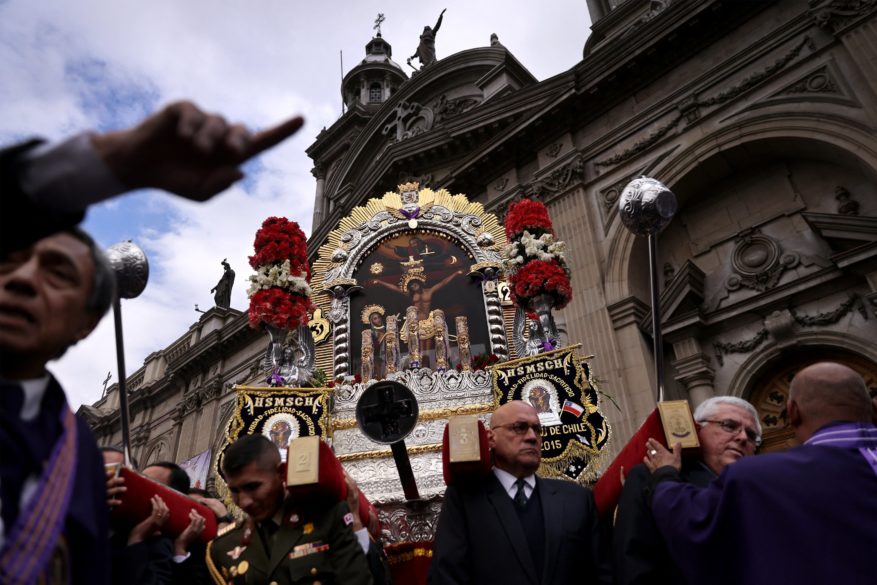
WORLD
LIMA, Peru (CNS) – The church in Latin America and the Caribbean is called to be a missionary church that heeds the cry of the poor and excluded; a synodal church where women, young people and laypeople have greater roles; and a church that is evangelized even as it evangelizes, according to the final document of the church’s First Ecclesial Assembly held a year ago in Mexico. The document of reflections and pastoral challenges resulting from the assembly was released by leaders of the Latin American bishops’ council, CELAM, Oct. 31 during a news conference at the Vatican. The conference was livestreamed on various platforms. The publication reflects a desire for a church that “goes out to the periphery … a Samaritan church … a church that builds fraternity, which is grounded in love, in the encounter with those who suffer most,” Archbishop José Luis Azuaje of Maracaibo, Venezuela, president of Caritas in Latin America and the Caribbean, said in a video message at the presentation. The document is the fruit of a monthslong process that included a “listening” period from April to August 2021, during which some 70,000 people throughout the region provided input, followed by the weeklong assembly Nov. 21-28. That process, which echoed the methodology used for the Synod of Bishops for the Amazon in October 2019, made the ecclesial assembly “a practical laboratory” for the Synod of Bishops on synodality, which began with listening sessions this year, to be followed by meetings in Rome in 2023 and 2024, said Archbishop Miguel Cabrejos of Trujillo, Peru, CELAM president.
BANGKOK, Thailand (CNS) – Catholic bishops in Asia have committed themselves to engage with governments, nongovernmental agencies and civil organizations to respond to issues affecting the church and society in their work for a better Asia. “We believe that peace and reconciliation is the only way forward. We have envisaged new pathways for our ministry based on mutual listening and genuine discernment,” the bishops said in a statement issued Oct. 30, at the end of a two-week general conference. Ucanews.com reported the Federation of Asian Bishops’ Conferences organized its first general conference as a part of its golden jubilee celebrations that brought together 20 cardinals, 120 bishops, 37 priests, eight nuns, and 41 laypeople. The conference, with the theme “Journeying Together as Peoples of Asia,” sought to reaffirm the federation’s work of the past 50 years aiming to “revitalize the church and envision new pathways of service.” One of the paths they identified was “bridge-building” among religions and traditions and also “principled engagement with governments” and nongovernmental agencies on issues of human rights, eradication of poverty, human trafficking, care of the earth, and other common concerns. “The escalating violence and conflicts” in Asia call “for dialogue and reconciliation,” the bishops said without naming any issue or any nation.
By Cindy Wooden
VATICAN CITY (CNS) – Around the world, listening sessions for the Synod of Bishops gave many participants a sense of finally being listened to, but they also raised questions about how to promote greater inclusion in the Catholic Church while staying true to church teaching.
Two of the issues raised most often in reports sent to the Vatican were the need to respect and value the contributions women make to the church and the need to face “the impact of a lack of trust and credibility resulting from the abuse crisis,” according to the working document for the synod’s continental stage.
Titled “Enlarge the Space of Your Tent” – the Lord’s command to the people of Israel in the Book of Isaiah – the document said, “This is how many reports envision the church: an expansive, but not homogeneous dwelling, capable of sheltering all, but open, letting in and out, and moving toward embracing the Father and all of humanity.”
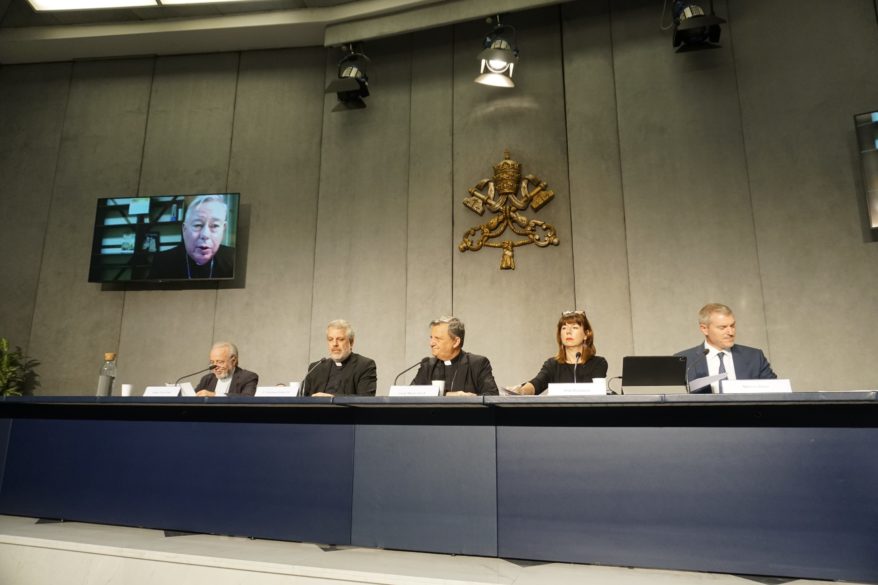
The document released Oct. 27 is the result of a group reflection on the syntheses of synod discussions submitted by 112 of the world’s 114 bishops’ conference, all 15 Eastern churches, 17 of the 23 dicasteries of the Roman Curia, the men’s and women’s international unions of superiors general, dozens of Catholic associations and more than 1,000 individuals, it said.
The general secretariat of the synod chose an international group of laity, religious, priests and bishops to read the submissions, pray about them and then draft a document that would help participants in the next phase reflect on the faith, hopes and concerns witnessed to in the reports. The document was approved by the cardinals and bishops belonging to the synod’s general council.
What emerged from the reports, it said, “is a profound re-appropriation of the common dignity of all the baptized. This is the authentic pillar of a synodal church and the theological foundation of a unity which is capable of resisting the push toward homogenization. This enables us to continue to promote and make good use of the variety of charisms that the Spirit with unpredictable abundance pours out on the faithful.”
Those who most often feel unwelcome in the church or undervalued, it said, include: women, young people, people with disabilities, the poor, those who are divorced and civilly remarried, single parents, those in polygamous marriages and members of the LGBTQ communities.
Responding to experiences of exclusion and discrimination shared by Catholic with disabilities, the document said that “in spite of its own teachings, the church is in danger of imitating the way society casts them aside.”
Reflecting the central place of the Eucharist in the life of the church, it said most submissions included a call for greater participation by all Catholics in the liturgy, working to ensure that it is less “concentrated on the celebrant,” involves more young people and women, including in preaching, and is more reflective of local cultures.
At the same time, the document also noted that in several reports, including that from the United States, some participants in the local listening sessions “lamented” Pope Francis’ decision to limit celebrations of the Latin-rite Mass according to the rite used before the Second Vatican Council.
“The quality of homilies is almost unanimously reported as a problem,” it said.
But the document also highlighted a common desire to find solutions to various forms of “sacramental deprivation,” including for people in remote towns and villages without a priest, as well as for civilly remarried Catholics and those in polygamous marriages.
While the reports were not “against priests or the ministerial priesthood,” the document said, many of them cited “clericalism” as an obstacle to being a “synodal church,” one where all the baptized share responsibility for the life of the community and for its mission of spreading the Gospel.
“Clericalism is seen as a form of spiritual impoverishment, a deprivation of the true goods of ordained ministry, and a culture that isolates clergy and harms the laity,” it said. Clericalism produces “rigidity, attachment to legalistic power and an exercise of authority that is power rather than service.”
In synod listening sessions around the world, participants noted that women are the majority of Catholics regularly attending the liturgy and staffing most paid and volunteer parish activities, yet it is mostly men who make the decisions in the church.
“Many reports ask that the church continue its discernment in relation to a range of specific questions: the active role of women in the governing structures of church bodies, the possibility for women with adequate training to preach in parish settings, and a female diaconate,” the document said. “Much greater diversity of opinion was expressed on the subject of priestly ordination for women, which some reports call for, while others consider a closed issue.”
Between January and March, smaller groups of church representatives are to meet on a continental or regional level; organized by bishops’ conferences, the groups are to include bishops, priests, religious and laypeople to read the document, pray about it and discuss which issues raised it in are most important and urgent for Catholics in their region to address in order to increase participation, a sense of communion and a commitment to missionary outreach.
By Cindy Wooden
VATICAN CITY (CNS) – The Nativity scene that will sit under a 98-feet-tall silver fir tree in the middle of St. Peter’s Square this year will feature 19 life-sized figures carved in cedar by artisans in the northeastern Italian town of Sutrio.
The tree comes from Rosello, a village of only 182 residents, in Italy’s central Abruzzo region, said a news release issued Oct. 28 by the office governing Vatican City State. The decorations on the tree are being made by young adults at a residential psychiatric facility in Rosello.

The tree will be lighted, and the traditional Nativity scene unveiled Dec. 3, the office said. The display will remain up until after the feast of the Baptism of the Lord Jan. 8.
The cedar for the Nativity scene figures, the Vatican said, came from trees selectively cut by gardeners to improve the health of other trees in several public and private gardens. None of the trees were cut specifically for the sculptures.
The Holy Family, the ox and donkey and an angel will be under an arched structure made of larch. The other figures – including the Three Kings, the shepherdess, a carpenter, a family and a “Cramar,” or local wandering salesman – will be on the surrounding platform or ramps leading to it.
The day before the office announced the plans for St. Peter’s Square, the Vatican’s Philatelic Office published a notice about the Vatican’s 2022 Christmas stamps, which were painted by Italian artist and activist Francesco Canale, who was born without arms or legs and paints holding a brush between his teeth.
He painted two stamps – one of an angel announcing the birth of Jesus to a shepherd and one of a shepherd adoring the baby Jesus.
By Cindy Wooden
VATICAN CITY (CNS) – With a renewed membership, the Pontifical Commission for the Protection of Minors met at the Vatican in late October and laid the groundwork for devising an annual report on child protection efforts by the Catholic Church globally.
Oblate Father Andrew Small, commission secretary, told reporters Oct. 28 that members also looked at the commission’s new relationship to the disciplinary section of the Dicastery for the Doctrine of the Faith and continued their efforts to promote greater transparency and fuller reporting to victims about the outcome of their cases.
“In our engagement with victim survivors, the acknowledgement of the wrong that was done to them is primary, being listened to, being believed,” Father Small said. “There’s nothing that takes the place of being believed and heard.”
But, he said, “seeing the wrongdoer continue to flourish at times or to appear without sanction is also very painful,” so victims are understandably confused or upset when they are not informed about actions taken by the church against an accused offender.
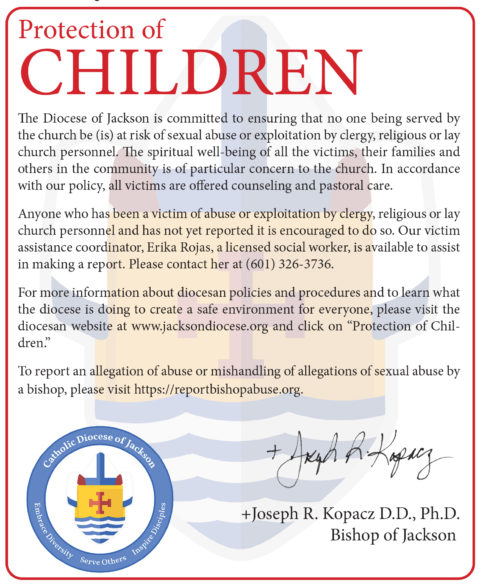
Because the commission is not involved in individual investigations and disciplinary procedures, Father Small said he could not comment on the case of Bishop Michel Santier of Créteil, France. When the Vatican announced in 2021 that the bishop was retiring, the bishop had said it was for health reasons. No one contradicted him publicly until mid-October when the Diocese of Créteil confirmed he had been credibly accused of sexual misconduct and disciplined by the Vatican.
The Vatican still needs to find a way to be more open while respecting local laws that protect the reputation of someone who is not guilty of a civil crime but may have violated church law, Father Small said.
If the church cannot figure that out, he said, not only will it be bad for the institutional church, “but it will be continually painful for the victims, who are the source and summit of the commission’s focus.”
When Pope Francis reorganized the Roman Curia, he linked the commission to the disciplinary section of the Dicastery for the Doctrine of the Faith. Father Small, writing in L’Osservatore Romano, the Vatican newspaper, said the move ensures the commission “would maintain its independence as an advisory body to the pope, with access to the bodies that exercise leadership within the church and with the mandate to oversee the adequacy of the church’s policies and procedures in the area of abuse prevention and safeguarding.”
So, Father Small wrote, the commission “will continue to be led by a president delegate, appointed by the pope and reporting directly to the pontiff. And decisions regarding the personnel, the members of the commission, as well as the proposals it produces, will remain independent of the dicastery. Pope Francis has been very clear that the independent voices of the members of the commission and those it serves should not be compromised.”
U.S. Cardinal Seán P. O’Malley of Boston has been president of the commission since its establishment in 2014.
During the commission’s meeting Oct. 27-29, it also announced the launch of a fund to help finance the establishment of “suitable centers where individuals who have experienced abuse, and their family members, can find acceptance and an attentive hearing, and be accompanied in a process of healing and justice, as indicated in the motu proprio ‘Vos Estis Lux Mundi.’”
Father Small told reporters that he believed 70 to 80 of the 114 bishops’ conferences in the world do not have stable, publicly accessible reporting mechanisms called for in Vos Estis, mainly because they do not have the resources. But with major funding from the Italian bishops’ conference and contributions from others, those listening and reporting posts will be established.
As for the annual report on the church’s child protection efforts worldwide, a report the pope asked the commission in April to develop, Father Small said commission members outlined a design for the report.
The first section, he said, would summarize reports bishops give to the commission while making their “ad limina” visits to the Vatican regarding their guidelines and implementation of Vos Estis.
For the second section, commission members will divide into teams to look at the church in specific geographical areas, focusing on giving a broader overview of child protection efforts in Africa, in Asia and Oceania, in Europe and in the Americas.
A third section will look at how dicasteries of the Roman Curia are including safeguarding in their activities; for example, how the Dicastery for Clergy promotes safeguarding awareness in seminaries, he said.
The final section will look at broader church efforts to protect children in the world by, for example, rescuing child soldiers, protecting migrant and refugee children, ensuring their safety in orphanages and foster care homes.
While Father Small said the commission should have something to give the pope in 2023, he does not expect to collect enough “actionable data” to begin doing a full annual report until 2024.
By Cindy Wooden
VATICAN CITY – Growth toward becoming a “synodal church,” one in which all the baptized accept and share responsibility for their unity and mission, can get messy, and that should not frighten people, said one of the undersecretaries of the Synod of Bishops.
“What we see with the synod is that the church is learning to face, to name and to be with the tensions, the polarities, the diversity” found among Catholics within parishes and across the globe, “and not just sweep them under the carpet,” said Xavière Missionary Sister Nathalie Becquart.
The process for the Synod of Bishops, like the sessions of the Second Vatican Council, is marked by theological, cultural and practical differences, she said, but she is confident that by listening to the Holy Spirit, listening to each other and being patient, consensus will prevail as it did at Vatican II.
Sister Becquart spoke to Catholic News Service Oct. 14, just before she and the synod’s top leadership had a private meeting with Pope Francis.
The meeting came three days after the pope celebrated a Mass marking the 60th anniversary of the opening of the council and pleaded with Catholics to resist the temptations of division, “quarrels, gossip and disputes.”
Synodality is the way forward, Sister Becquart said, pointing to Pope Francis’ explanation in the book “Let Us Dream”:
“We need a respectful, mutual listening, free of ideology and predetermined agendas. The aim is not to reach agreement by means of a contest between opposing positions, but to journey together to seek God’s will, allowing differences to harmonize. Most important of all is the synodal spirit: to meet each other with respect and trust, to believe in our shared unity and to receive the new thing that the Spirit wishes to reveal to us.”
Before the end of October, the synod office will release its “Document for the Continental Phase” of the synod, echoing the themes that emerged from all the national syntheses of synod listening sessions and the contributions of religious orders, Catholic movements, Vatican dicasteries and nuncios from around the world.
“It’s a working document,” Sister Becquart said. People who participated in the listening sessions will be asked to read it, pray about it and share their reactions with their national synod coordinators. Then bishops, priests, religious and laity representing the church in their country will meet with representatives from other countries in their region to discuss what “resonates” with them or what they believe is missing.
The idea, she said, is that the synod is not just a one-way process from the grassroots up to the “top.” Rather, the process is “circular,” because a key part of “synodal ecclesiology that comes from Vatican II” sees an “intrinsic link between the local churches and the universal churches” and aims to deepen that relationship.
In the document for the continental phase, the synod office is returning results to the local level, checking that they were heard and asking them to broaden their reflection with people in neighboring countries.
The Synod of Bishops and, especially, the vision of “synodality” is one of “the fruits of Vatican II,” she said, but they are also paths that can help the church and its members receive and experience some of the key insights of the council.
Sister Becquart pointed particularly to how, with all the Catholic bishops of the entire world gathered in Rome in four sessions from 1962 to 1965, the council was the most concrete experience ever of the church being universal. And its focus on the church as “the people of God” rather than primarily as an institution and its emphasis on the dignity and responsibility of all the baptized are being rediscovered in the synod process, she said.
And, she said, while the 16 documents approved by the council are essential reading, people should not forget that for the participants, the Second Vatican Council was “a human, spiritual and ecclesial experience.” The national reports indicate something similar was happening to many of the people participating in the local listening sessions, she said.
As the process continues, bumps in the road are expected, she said, because “it’s a new way to relate to each other, a new kind of communication and relationship dynamic in the church,” particularly between bishops and laity.
“It is, as we say, a work in progress.”
By Cindy Wooden
VATICAN CITY – Saying he did not want to rush the process of discerning how the Holy Spirit is calling the church to grow in “synodality,” Pope Francis announced that the next assembly of the Synod of Bishops would take place in two sessions.
The synod assembly, with mostly bishops as voting members, will meet Oct. 4-29, 2023, as previously announced, the pope said, but the assembly will have a second session in October 2024 as well.
Pope Francis made the announcement Oct. 16 at the end of his Angelus address. He had met Oct. 14 with the synod leadership.
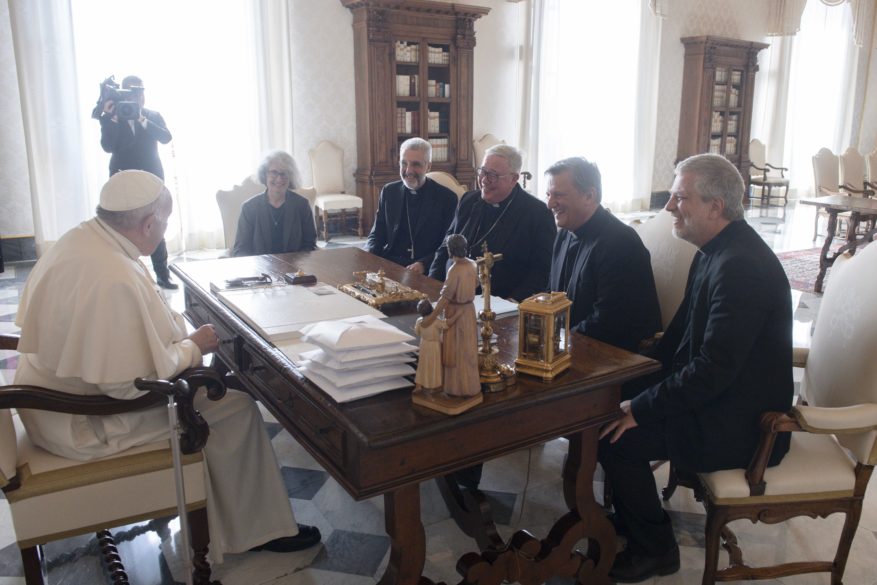
The pope and local bishops kicked off the listening and discernment process for the “synod on synodality” in October 2021, and by November the synod secretariat is expected to release a working document for continental assemblies.
With 112 of the 114 bishops’ conference in the world having sent in a synthesis of what emerged in the listening sessions in their countries, Pope Francis said that “the fruits of the synodal process underway are many, but so that they might come to full maturity, it is necessary not to be in a rush.”
“To have a more relaxed period of discernment,” the pope announced, “I have established that this synodal assembly will take place in two sessions” rather than the one originally planned.
“I trust that this decision will promote the understanding of synodality as a constitutive dimension of the church and help everyone to live it as the journey of brothers and sisters who proclaim the joy of the Gospel,” Pope Francis told thousands of people gathered in St. Peter’s Square for the Sunday Angelus prayer.
The website of the synod secretariat describes synodality as a style seen in the church’s life and mission that reflects its nature as “the people of God journeying together and gathering in assembly, summoned by the Lord Jesus in the power of the Holy Spirit to proclaim the Gospel.”
While it does not imply everyone has a vote on issues facing the church, it does mean that all the members of the church – ordained or lay – have a responsibility to contribute to the church’s mission and to pray, offer suggestions and join in discerning the voice of the Holy Spirit.
A statement from the synod secretariat Oct. 16 said Pope Francis’ decision to add a second assembly “stems from the desire that the theme of a ‘synodal church,’ because of its breadth and importance, might be the subject of prolonged discernment not only by the members of the synodal assembly, but by the whole church.”
Although it did not feature the same widespread, grassroots listening sessions, the deliberations of the Synod of Bishops on challenges and joys facing families also met in two sessions. First, Pope Francis convoked in 2014 an “extraordinary general assembly” on “the pastoral challenges of the family in the context of evangelization.” Then, using the 2014 gathering’s final report as an outline, the ordinary general assembly of the Synod of Bishops met in 2015 to look at “the vocation and mission of the family in the church and contemporary world.”
Cardinal Lorenzo Baldisseri, then secretary-general of the synod, wrote to bishops’ conferences at the time explaining that, “the two synodal assemblies, sharing the same topic of the family, become part of a single synodal process, which includes not only the two celebrative phases but also the intervening time between synods, a time to reflect on the reaction to the first synod and to make a thorough theological examination of the church’s pastoral activity in light of the succeeding one.”